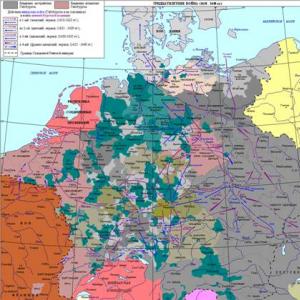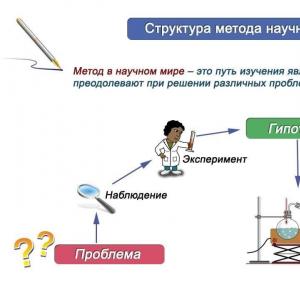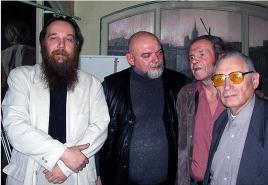Communion and Temploying theory. Temploying and a height turnover - these are two actions in one
Communion and Templocoming - this is nothing more than special forms of verb. This article describes in detail the grammatical and syntactic signs, methods of education, characteristic features of communals and verbalias. For better mastering material, examples and important points are given.
Communion and Templocoming in Russian - These are two special forms of verb, which are distinguished by the value, grammatical and syntactic features. Communions indicate a sign on action and answer questions What? Which the? What makes? What made? What made?Teperysty denote an extension effect and answer questions What do you do? What made?
Concerning the use and spelling of communion and verbal, the rules with examples are shown in the table.
| Tempecios | Participle | ||||||
| rules | Examples | rules | Examples | ||||
| Grammatical signs | Unchanging part of speech, has grammatical signs of adverbs and verbs | A variable part of speech, has signs of adjective and verb | |||||
| sign of adverbs: immutability | signs of verb: · Transaction; · Return |
decided to meet playing with kids, reading book noticingad | signs of adjective: · The presence of complete and brief form; |
signs of verb: · Transaction; · Return |
decided to the meeting; playing with children, advise readable Book, announcement noticed Paskish | ||
| How to form | -and I(NSV); -In /----h (Sv) |
drawing, mining, lying,making, answering, breaking | From verbs with suffixes: -Tee - / - Yusch - / - Ast - / - (valid communion of HB); -B- / - (valid communion of PV); - / - Om - / - Im- (Supporting communion of HB); -nn - / - ENN - / -(Pv PV). |
drawing, produced, lying, made, answered, broken | |||
| Syntactic signs | The proposal refers to the verb. The syntactic role is the circumstance. |
RespondingHe returned to his place.
The girl went down the street, smiling. |
The proposal refers to a noun or personal pronoun and is consistent with them by the family, the number, padege. The syntax role is a definition or part of the composite nominal faith. |
Arrived Birds greedily knew grains(Definition). Bread was baked just yesterday (part of the SIS). | |||
Note! Communions in Russian are changed by childbirth, numbers and cases. Tempecism do not change and have no end.
Features of involved and verbal turns
Involved and adapter - These are syntactic structures that differ in the overall value and function in the sentence:
- Participial turnover - This is a verbality with dependent words. In a proposal, as well as single verbatility, perform a syntactic role of a separate circumstance (allocated from two sides with commas) and denote an extension effect.
Involved turnover and adapter In the syntax of the Russian language represents structures where communities and verbalias together with dependent words form a holistic syntactic structure.
Features of revolutions.
This design is indivisible and in the sentence is:
- the definition - at the communion (that is, it is responsible for the definition questions - "what", "which", "which", etc.)
- the circumstance is in Tempecism ("What do you do?", "What?").
Candle, (what?) flickering in the night, burning out - participial.
Young horse, (what making?) fucking and playing, volunteer felt in the manneva - participial turnover.
Involved and verbal Each of their rules are separated by commas.
Property offers: Examples.
- The involvement of the turn is after the word determined: Wolves avoid a trail, (which?) patched man.
- The definable word is personal pronoun: Hanging on the wall, she (what?) Suddenly fell.
- The involvement of the turn is the reason (circumstances or concessions): Tired to the last stage, climbers did not risk moving further; Frightened by Trresco PetardThe kitten was hammered under the sofa. Tired of long flight, the boy quickly fell asleep.
If the involuntary turnover is after the word determined and is in the middle of the sentence, it is allocated with commas on both sides. Example: Behind the window flew snow, blown, and fell on the stall earth.
In language there are cases when separate trafficking is in the distance from the defined word. For example: In the sky windy wind, torn, gloomy clouds ("Clouds" - what? "Windy wind").
DEPARTMENT SUPPLY: Examples.
Participial turnover - It is a verbality with a dependent word or several words, which means an additional action that makes the main person (as a rule, it is subject to). In any case, regardless of the position to the defined word, is allocated by commas.
The proposals with a perpetrator does not have punctuation marks, if an inaccessible turnover and a homogeneous circumstance, pronounced next to him, are connected by the Union and. For example: He said lazily and slightly stretching words.
In other cases, solitary temploying and particleless turnover are isolated. For example: Judging by his toneI thought that he really was annoyed by my clumsy.
If the verprepiece is in a circumstantiated value, it is not separated. For example: She entered smiling.
And verbalia. There is no need to talk about the mysteriousness of these parts of speech: the question of their place in the morphology of the Russian language has not yet been resolved. Their own signs, features and differences consider in our article.
Sevective Education
The fate of these parts of speech remains unknown. In the modern school program, depending on the author of the educational and methodological complex, the concept of what communities and verbalism are interpreted in different ways. Some authors, as, for example, Razumovskaya, rightly consider them peculiar forms of verb. Undoubtedly, the proportion of truth in this is, since communion and verbalia were formed from the verb.
Both of these versions are entitled to existence, they are logical and each of them can be argued in their own way.
Here is such a mysterious, Russian. Communion and verbal spirits are special forms that make our speech more dynamic and colorful.
Turnover with communion
Any part of speech is noteworthy in its own way. And what is the communion and verbalism, what are they doing in a proposal special, which other parts of speech can not? Their main distinctive feature is the formation of revolutions. This happens when one of them has dependent words.
For example: The girl walking on the summer garden admired nature. If you carefully consider this offer, then we will see that the "Walking" communion can be asked the question "Where?". The answer will be the phrase "on the summer garden". This means that our involvement is in front of us. It is much more literate and more beautiful to use turns than infinitely repeating the word "which".

Do not forget to put the commas, if it is after your defined word (here it is "girl"). When syntaxed, the question arises: how to emphasize it? Everything is simple here: ask a question from the defined word: (girl) what? A secondary member of the sentence is responsible for him, we all know - definition. Therefore, it is completely the entire turnover to emphasize the wavy feature.
In the case when the turn is in front of its defined word, everything is different. There you do not need to put commas. The syntactic function of such turns is different - each part of the speech is emphasized independently of each other.
Participial turnover
The situation with him is a little different. First of all, in itself, the need for adoption may not contain any dependent words, but, nevertheless, it will be allocated by commas. Linguists call it single.
For example: Without pondering, he rushed into a burning house to save people.
As you can see, the verbal spirits are very similar to the meaning with the adverb (here is responsible for the question "How?"). You can even replace it with this part of speech: he quickly rushed into a burning house to save people.

As in the case with a brother-communion, a verbality may comply with the words and form a turnover. Since in the sentence, it always performs only one role, it is accepted with the punctuation marks here you will not pick up: the commas are always set. And you do not need to look, as the definable word is located relative to this turn.
For example: without performing a homework, Misha went for a walk.
From the lead "without fulfilling", ask the question "What?" And we get the answer - "homework". Before us is an adapter turnover.
And Tempecistry
The word formation of each part of speech is studied by schoolchildren, starting from the fifth grade. Some of them (for example, the noun and adjective) have several ways to appear new words: not only the subfixary and suffix, but also addition and abbreviation. With communion and greetings, everything is easier: their main way of word formation is a suffix. It is on this morpheme that we distinguish them from other parts of speech.
Knowing what communion and verbalism are, remember suffixes will be easy. You need to know a few simple rules. Do not forget that the communities are divided into two large groups: valid and suffering.

The valid communities that are in the present, suffixes are: Caution / Youth (Dancing, Singing), Ast / Lasch (Screaming, Flying).
In the suffering - EM- (conductive), -th- (injected), they (dependent).
When the communities are in the past time, they will also be distinguished by deposit.
Action. Prich. : - vSh- (bought), w (grown).
Strada. : - t- (split), -enn- (scrolled), -nn- (extinct).
The main thing that needs to be done is to correctly determine the part of speech. Then the suffixes of communions, verbalia remember much easier. Especially, they are similar to each other.
Tempets have no collateral category, they differ only in time. Nast.: - a (slowly), -Yu (guessing), - Had (being), -. The past time is: -I (Having done), he had (not knew).

Conclusion
The suffixes of communion and verbalism are easily remembered in practice. It is enough to perform several exercises on this topic to consolidate their spelling. Despite the seeming complexity of these verb forms, they will not make much difficulty for those who carefully read the rule.
The concept of communion and verbalism
Before talking about involuntary and particlepric circulation, it should be decided with the understanding of the verdict and the communion.
Participle - Part of speech, which answers the adjective questions, but having the properties of the verb.
At the moment there is no unity in understanding the communion of linguists. So, some perceive the sacrament as the form of the verb., Others consider it an independent part of speech. The peculiarity of the communion is that it is consistent with the name nouns. The communion is always formed from the verb, but has signs of adjective.
Deeppripter also causes disputes in linguistic circles. For some - this is a form of verb, and for others it is an independent part of speech. In the meantime, the verbatility is endowed with both the features of the verb and the devils of adverbs.
Tempecios - Form of the verb or part of speech, which answers the question "What Making?", "What?" and has properties and verbs and adverbs.
Involved and verbal turns
Communion and verbalism in the proposal form special revs. Involvement Contain the sacrament and denote a sign on action. Sale revisions are responsible for questions: "What?", "What?", "What does it make?", "What made?". The involvement in the proposal refers to the defining word, which is the name of the noun.
Participial The proposal acts as a separate or non-determined definition.
For example: Clouds right approaching and already covered full, threatened to us the fast, torrential rain.
A perpetual turnover includes verbal spirits. It refers to the lean and performs the function of circumstances.
Participial turnover The proposal performs the functions of a separate circumstance.
The use of a height turnover in the proposal implies that the main action, expressed by the verb-tajam, and the additive action, expressed by verbalism, belong to one person or subject.
For example: I, removing the room, Found her glasses.
An accructive turnover can be used with infinitive in an impersonal offer.
For example: Considering this issueIt is necessary to attract all available resources.
Allocation of involved turns with commas
The rules for the allocation of involved turnover of commas need to know each. The involvement of revolutions are highlighted with commas. However, you can not always immediately allocate the boundaries of the involvement.
For example: At that memorable day bus, riding in Crimea, stayed for a few minutes, and I managed to buy a large bottle of mineral water.
When determining the boundaries of the involvement, it should be remembered that it is located in front of the word-defined and has a circumstantiated reason or concession.
For example: Frightened with loud voices, Lan with big eyes from fear, rushed towards the forest thicket.
Often the involvement of the turnover is separated from the determined word, nouns or personal pronouns, other members of the sentence.
For example: Burning, lay on side old wooden trough.
In the example above, it is obvious that the involvement of the turnover refers to the word "trough", and not to the verb "lay". Accordingly, in this case, the involvement of turnover is allocated by commas.
If the involvement of the turnover is facing the defined word, the commas should not be set.
For example: Written earlier The text did not make sense.
The involvement of the turnover belonging to personal pronoun, regardless of its location in the sentence, is necessarily separated by commas.
For example: Tired of a senseless disputeI turned around and slammed the door loudly.
Separately discusses the punctuation of proposals with the communion, if it is part of the composite name of the facility. There are serious difficulties in the allocation of such communion. For example: The road was broken, overgrown with grass and filled with small stones. "Road" What? "Was broken, overgrown ... and covered."
Selection by commas camehroles
Temployees Usually allocated with commas. An accructive turnover is usually separated regardless of the place occupied by him with respect to the verb-to-beam.
If an adapted turnover costs after a writing or subordinate union or a union word, then the turn is separated from it. To check, you can try to "tear out" a perhaps turnover from the Union and rearrange the offer to another place. In this case, the meaning will not change.
For example: Became audible like counting seconds with metronome accuracy, dripping from the tap water (paustovsky).
There are cases when you should not be distinguished by a diplocked comma. First of all, these are the cases where the particralization of the turnover is closely related to the content with the faugible and forms the meaning center of the statement. At the same time, the turnover most often acts as an circumstance of an image of action.
For example: Cat sat slightly leaning forward.
The accompany turnover is not released by commas if the turnover acts as a homogeneous sentence of a sentence with an optional circumstance.
For example: To the doors of the office, everyone came together usually walking on tiptoe. (L.N. Tolstoy)
The comma does not put if the hemplifted turns relate to one led in the sentence. In other words, they are homogeneous circumstances.
For example: The conductor went ahead, without driving a step and without changing the direction of movement.
The perhaps turnover is not separated by commas if it is an idiomatic expression (usually by phraseological circulation).
For example: She worked do not donate hands.
The syntax of the Russian language is a perfect and slim system. Its main units are considered to be phrases and suggestions. Among the latest most frequently consisting of proposals with involved and particle turns.
What is the involuntary turnover, schoolchildren usually assimilate easily, and about the hardwort is worth talking in detail. What is this design, what is its features, how to make a proposal with it?
An accructive turnover (before) is a syntax unit that includes such a part of speech, as well as the words dependent on it. The specified part of speech, as a component of turnover, indicates that the subject to perform not only the main, but also an additional action.
This main member is most often expressed by independent parts of speech, for example, by name by nouns or pronoun.
Teperychpihood includes signs of verb and, so it is logical that it is necessary to ask questions to it: how? How? Where? etc.
You can ask special questions for convenience: what making? What made? The turnover is also responsible for the same questions.
As a member of the proposal, a perhappy turnover is a circumstance. When syntaxially, the barcode dotted line is emphasized. Describing the design, it is necessary to indicate that the proposal is complicated by a separate circumstance.
Examples of structures comprising in their composition to:
- Leaving the north finally, the peers forgotten for a long time, I visited Bakhchisaraya to oblivion the dormant palace. (A. Pushkin)
- Jumping on the horse, the prince cried in the field, crossed the bridge through Kai, and behind him, rod weapons, flew his chop. (A. Tolstoy)
- She pronounced the words of his own role when he left the room, it bowed to the belt, laughed, closing the sleeve, and earned the approval of Martushi. (A. Pushkin).
The perpetual turnover is studied in the classic course of the Russian language in the school program in grade 7. Below we give exercise options.
Task: Rewrite to the notebook, arranging commas in the right places, emphasize before.

Task: Carefully read the instructions for the exercise. Rewrite sentences by correcting the grammatical errors.

Task: Insert the missed punctuation signs. Choose from brackets suitable by sense of verprice.
- I crossed a hooligan (chasing, driving) pigeons and (playing, playing) in the towns with my peers, which a great set lived in the window.
- One day, the Mother cooked in the living room honey jam and I (losing, licking) looked at kipheny fifts.
- (Waking up, waking up) in the morning I looked at the window quite late and drew attention to yesterday's bad weather there is no trace.
- (Arriving, arriving) in Vladivostok I rightly arrived from the station to my aunt and uncle.
Commas in sentences with to
 In the proposal, the verbal turnover is always separated, that is, stand out on a letter to commas.
In the proposal, the verbal turnover is always separated, that is, stand out on a letter to commas.
The rule is simply rememberable because there are only three types of comma formulations:
- First, it may be at the beginning of the sentence, and in this case the punctuation sign is put after it.
- Secondly, it can stand in the middle, then the commas are put on both sides.
- Thirdly, the offer may end. If so, then the sign must be put in front of it.
It's important to know!Sometimes an adapted turnover can be represented by phraseologism. In this case, the turnover is not separated. For example: he risen through the puddles of the praying head.
Consumption of adapter turnover in the proposal
Building a sentence with an accomplice turnover often causes problems from schoolchildren. In order to prevent speech errors, it is necessary to remember that the verbatility in the sentence indicates an extension action that performs the subject. In other words, the person who needs to fulfill the main thing, and the additive effect.
For example: rising from the bottom, Shakhtar pushed for a long time, looking at the sunset.
Given the grammatical meaning of verbalism, it is not recommended to use it in turnover in the cases described below:
- Single-line impersonal offer. For example: looking forwarding, I did not sleep.
- The failed in the proposal is expressed by the suffering communion of a brief form.
- The main action expressed by the verb and the adding action relate to different persons. For example: Running without a break in the school stadium, the boy began to boil legs.

How to find a height of the priority in the proposal right? To do this, you must perform a number of conditions:
- First, find a height. Its formal indicator are morphemes -A / -Y, -in / -h /-----t.
- Secondly, to determine the lean and ask the question from him, as before they always belong to the verb-to-beam.
- Thirdly, a perhaps turnover on the letter is allocated with commas, and in oral speech is distinguished by intonational.
How to make a part-off turnover and proposal with him
Grammatically correct construction from up to - is not easy. To avoid errors, you need to follow the rules:
- To and any other suggestion cannot be treated, actions expressed by verbalism cannot be treated.
- In suggestions with a suffering tint it is impossible to use particle inclusive turns.
- In sentences where the verb-fag is expressed by the form of a real time, it is undesirable to use a heaway.

- Having leaning out the window, the hat flew with me.
- Going out of the apartment, the citizen was scared with unexpected dogs of the dog.
- Having started cooking dinner, I will definitely see the evening news release.
Important!It is rarely used to be consistently used in a single-line design, but in the case when the main member is infinitive. For example: Planning a lesson, it is necessary to take into account the age-related features of students.
The location of the height turnover in the proposal is strictly not regulated. But in some cases it is necessary to observe strict order:
If it is put before the legend, it must designate what was before in relation to the value of the fag. - Collecting the notebook, the girl put them on the teacher's table.
After the fague must be before, the value of which follows. - boiling water splashed, screaming my leg.
The view of the despyrigalism is important. The imperfect view of this part of speech is combined with the verb, which denotes the action that occurs simultaneously with the added. - Laughing, girl caught rainbow splashes.
The perfect species of perfect species are well combined with the faees, the values \u200b\u200bof the actions of which precede an additional action. - Shooting, the baby splashed his hands.
Useful video
Output
Now the question is how to find an adapted turnover will not find a student by surprise. The competent use of such structures in writing speech testifies to a high level of education and allows you to more accurately express your thoughts.
In contact with







